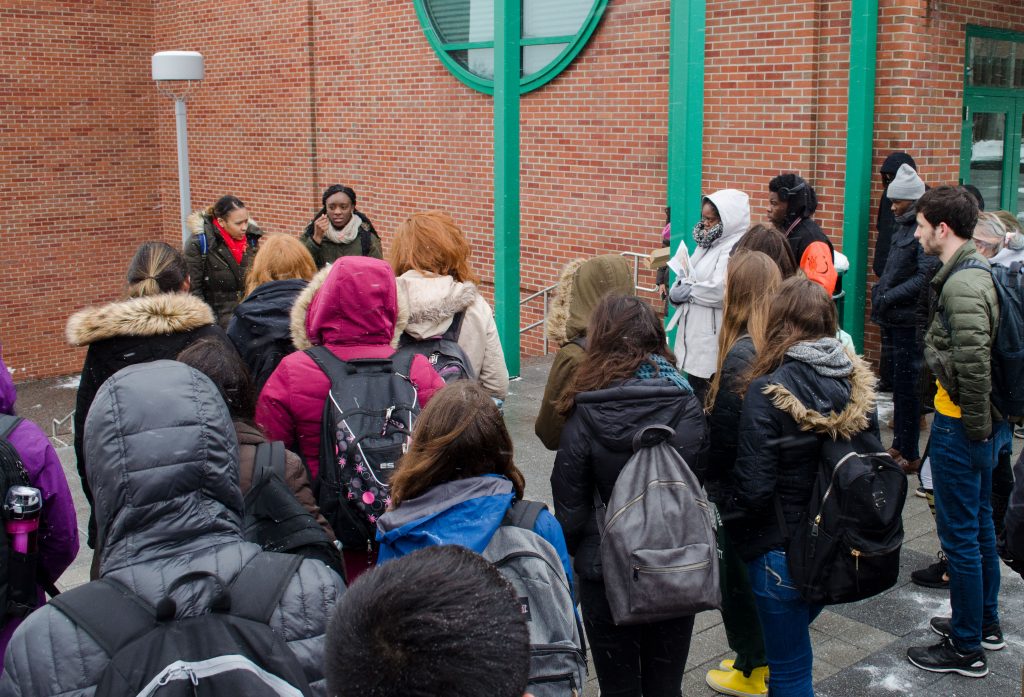
Since Jan. 1, more than a dozen school shootings have occurred in the United States. On March 14 at 10 a.m. local time, students walked out of classrooms across the nation in hopes of sending one message: Enough is enough.
The walkouts were a part of the “#Enough National School Walkout” to raise awareness for issues of gun violence and the need for reform. The National Association for the Advancement of Colored People (NAACP) Binghamton University chapter hosted a walkout in solidarity with students around the country.
Approximately 40 students stood in the snow outside the University Union for 17 minutes, one minute for each of the 17 victims of the Parkland shooting. The names of the victims were read by Ra’Vynn Waters, the second vice president of BU’s NAACP and a sophomore majoring in nursing, and a moment of silence was held for each one, as well as for other victims of gun violence. An additional moment of silence was held for former BU student Haley Anderson, a senior majoring in nursing who was killed last week.
Those walking out at BU did so in support of the demands on gun reform outlined by the NAACP. The four demands call on Congress to require universal background checks on all gun sales, ban military-style semi-automatic assault guns, ban high-capacity ammunition clips and enact tougher criminal penalties for illegal gun purchases and gun traffickers.
The national movement was organized by Women’s March Youth Empower, an offshoot of the national Women’s March organization, in support of the March for Our Lives movement that started following the school shooting in Parkland, Florida on Feb. 14. The walkouts were scheduled on the one-month anniversary of the shooting at Marjory Stoneman Douglas High School.
According to the NAACP, while the National Instant Criminal Background Check System has prevented nearly 1.3 million prohibited purchasers from buying guns.
Waters said that these measures are crucial not only for students, but also for communities of color, which are disproportionately affected by gun violence. According to Lea Webb, diversity specialist for the Division of Diversity, Equity and Inclusion and one of the advisers for the NAACP on campus, having discussions about stopping gun violence is necessary for the United States to move forward.
“We have to do better as a country, as a community, to address these issues as they pertain to gun violence and also have more in-depth conversations about the fact that it’s easier to get access to weapons than it is to get access to equitable education,” Webb said.
In the remaining minutes of the walkout, a few students discussed how attendees can continue promoting the message of #Enough. Chukwudi Kanu, a senior majoring in systems science and industrial engineering and a member of the MALIK fraternity, promoted an active shooter training with Binghamton’s New York State University Police Department held that evening. While Kanu said the timing was a coincidence, it was beneficial since the walkout energized students and prepared them to be reactive to gun violence and proactive in preventing the issue.
“UPD is trained to deal with these situations, but students are not and I think UPD has the knowledge, so bring that to the students,” Kanu said.
Local efforts will continue on March 24 at the Binghamton March for Our Lives, which will start at Binghamton High School and end at the Federal Building and U.S. Courthouse in Downtown Binghamton. The march is planned in conjunction with hundreds of other marches around the country, including a central one in Washington, D.C.
Sarah Merke, an undeclared freshman who attended the walkout, said it is time for students to educate each other in order to end gun violence.
“I think all of us should be able to live the way we want to without having fear,” Merke said. “I think it’s sad that most of us have to go to school or walk down the street with the sense that anything can happen to us.”


